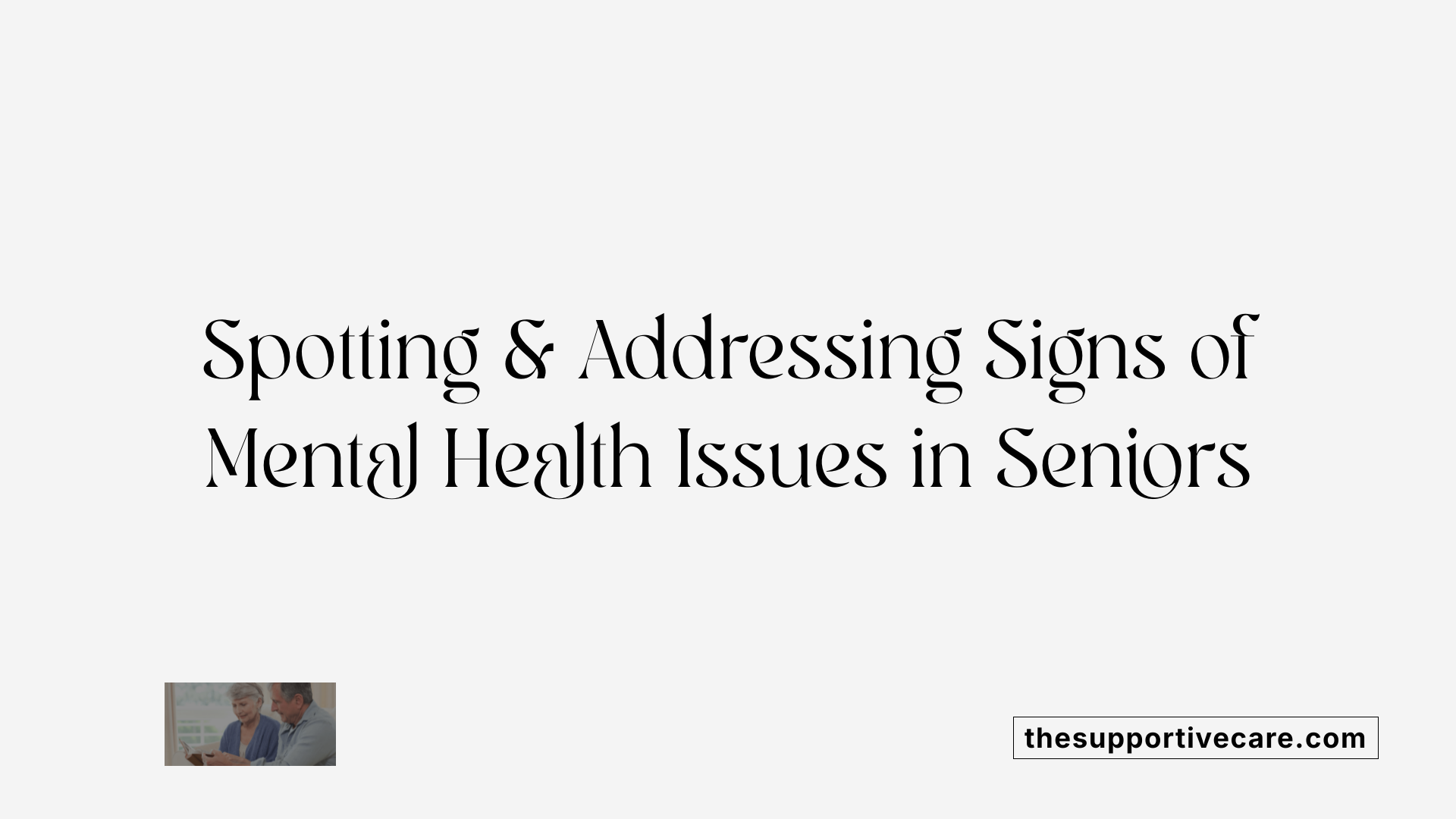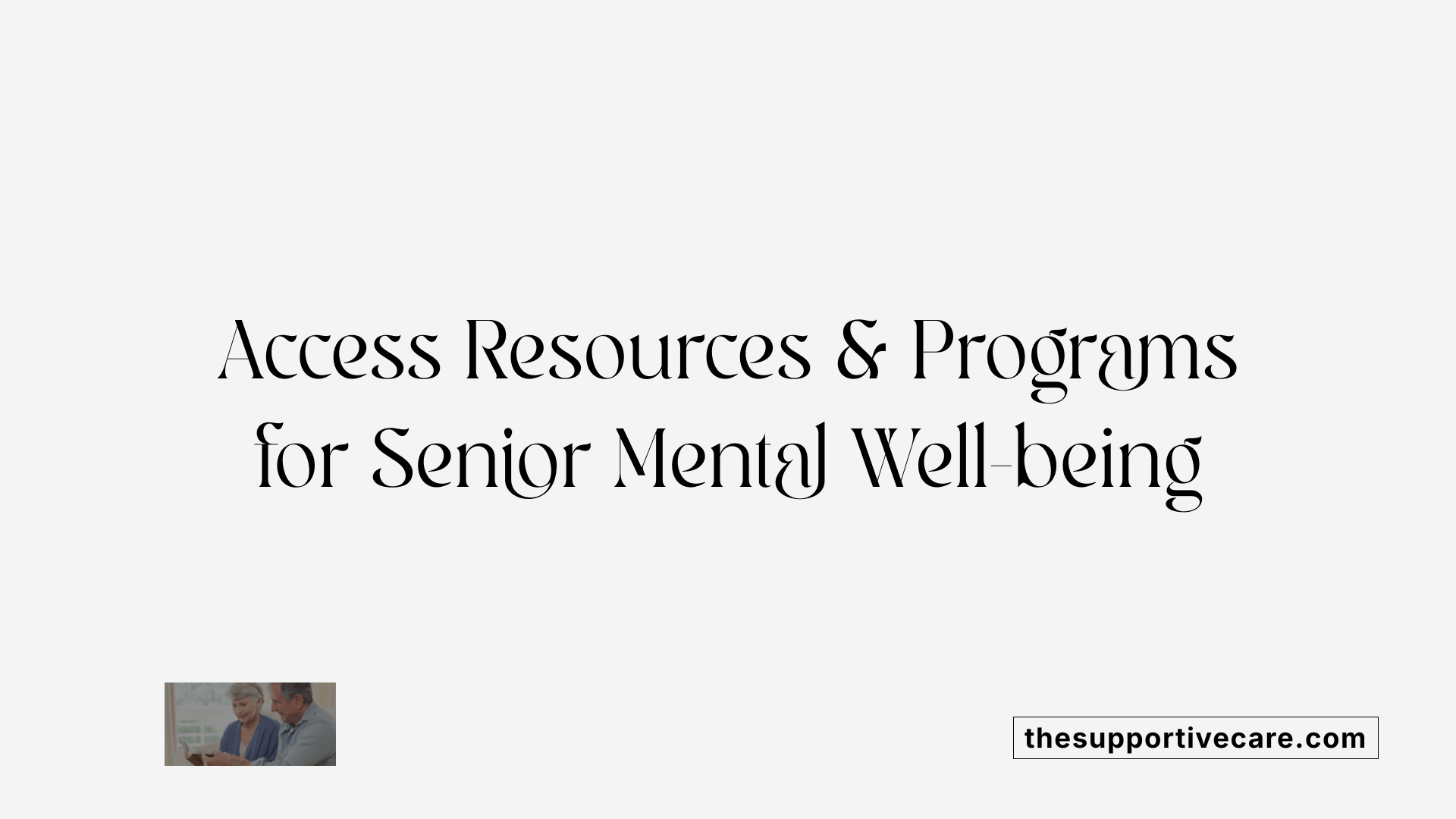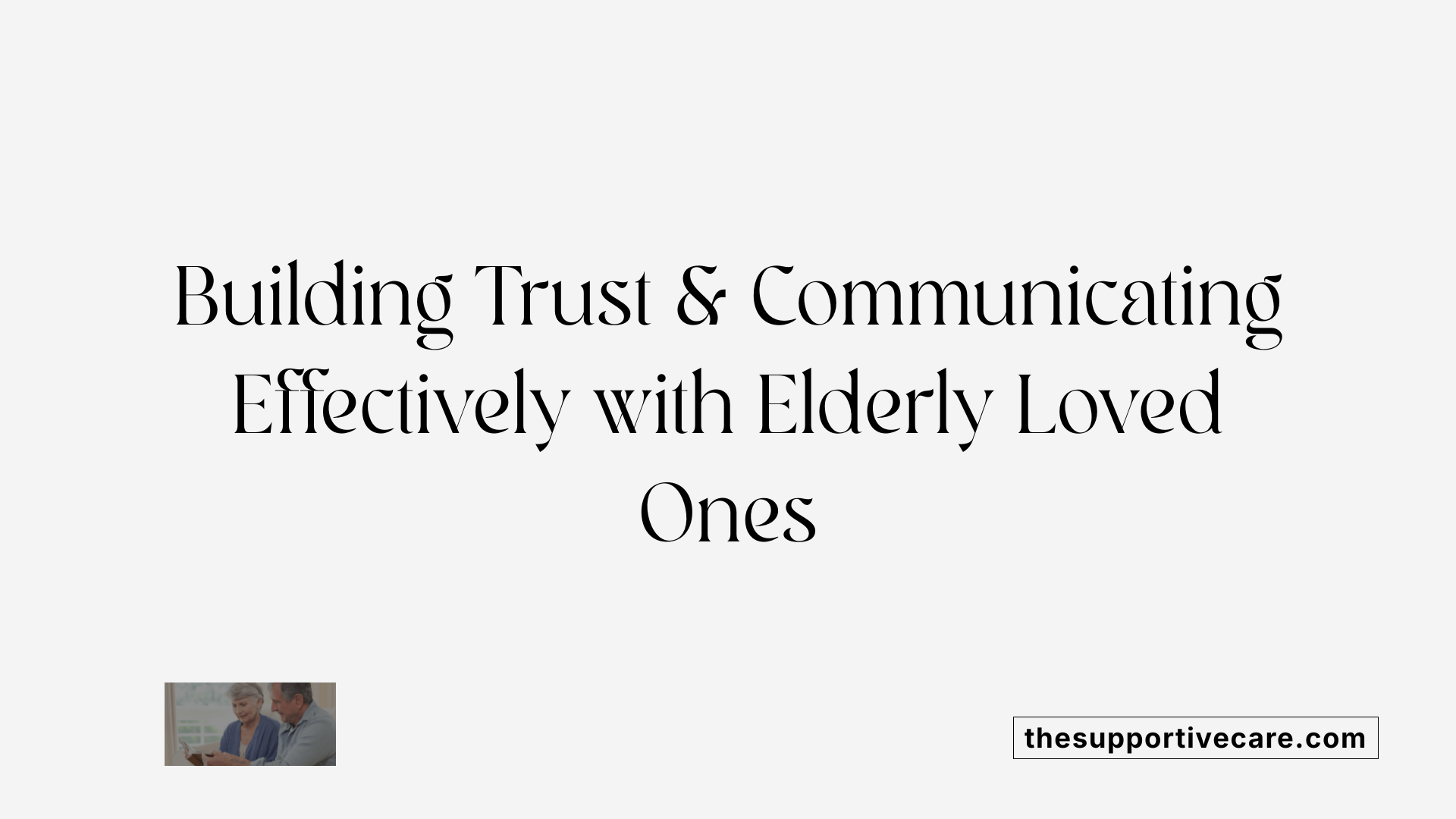Understanding the Unique Mental Health Landscape for Senior Couples
As couples grow older together, they face a range of emotional and mental health challenges that can impact their quality of life. Recognizing these issues early, fostering open communication, and accessing appropriate resources are vital steps to supporting mental well-being in senior relationships. This article explores common mental health challenges among elderly couples, effective caregiving strategies, available support resources, and ways to promote resilience and emotional health.
Common Mental Health Challenges in Elderly Couples

What are common mental health challenges faced by elderly individuals and senior couples?
Elderly individuals and senior couples often encounter mental health issues that can significantly impact their quality of life. The most prevalent challenges include depression, anxiety, and feelings of loneliness or social isolation. These symptoms can arise from various life changes such as chronic illnesses, the loss of loved ones, or shrinking social circles.
Depression in seniors may manifest as persistent sadness, fatigue, or a loss of interest in favorite activities. Anxiety can present as excessive worry, restlessness, or physical symptoms like headaches or stomachaches. Feelings of loneliness are particularly common when social connections weaken, leading to sadness and emotional distress. Cognitive difficulties and sleep disturbances often accompany these conditions, complicating their management.
Beyond common issues, older adults are also at risk for serious mental health disorders such as bipolar disorder, post-traumatic stress disorder (PTSD), psychosis, and suicidal thoughts. These conditions require prompt diagnosis and treatment to prevent further deterioration.
Barriers like stigma, misconceptions about aging, and lack of awareness can make it harder for seniors to seek help. Effective therapies include psychotherapy, medications, and in some cases, electroconvulsive therapy. Supporting seniors involves fostering social engagement, guiding them through healthcare options, and ensuring access to mental health resources.
In summary, recognizing and addressing these mental health challenges is vital in helping elderly couples maintain emotional well-being and resilience as they age.
Supporting Loved Ones with Mental Health Difficulties

How can families and caregivers support elderly loved ones experiencing mental health issues?
Supporting older adults facing mental health challenges is a vital aspect of caregiving. Families and caregivers can begin by fostering open and honest communication. Creating a safe space where seniors feel comfortable sharing their feelings without fear of judgment encourages trust and openness.
Active listening plays a significant role in this process. Showing genuine concern through reassurance and empathetic responses helps the individual feel understood and supported. Asking about their experiences and feelings can provide insights into their mental state and help identify early signs of distress.
Recognizing warning signs is essential. Changes such as persistent sadness, withdrawal from social activities, sleep disturbances, or sudden mood shifts may indicate underlying issues like depression or anxiety. If any of these signs are present, connecting the person to professional mental health services becomes a priority.
Connecting seniors to appropriate resources is crucial. This may include scheduling appointments with mental health professionals experienced in geriatrics, using crisis helplines like 988, or exploring community-based support programs. Educating oneself about mental health helps reduce stigma and empowers caregivers to advocate effectively.
Moreover, supporting treatment adherence, whether through medication management or therapy participation, can improve outcomes. Encouraging participation in social activities, hobbies, and physical exercise enhances mood and overall well-being. Maintaining a structured daily routine and fostering social connections can combat feelings of loneliness and isolation.
Lastly, caregivers should remember to look after their own emotional health. Support groups like NAMI’s Family-to-Family program offer valuable guidance and peer support, reinforcing the importance of shared experiences in caregiving.
By combining these strategies—effective communication, early recognition, professional connections, and self-care—families and caregivers can play a crucial role in supporting their loved ones through mental health difficulties and promote a path toward resilience and recovery.
Identifying and Addressing Signs of Mental Health Problems

What are the signs and symptoms of mental health problems in older adults?
Mental health challenges in seniors can manifest through a variety of physical, emotional, and behavioral changes. Recognizing these signs early can lead to timely support and treatment.
Common symptoms include noticeable shifts in mood or behavior. An older adult might seem more withdrawn, show signs of increased sadness or hopelessness, or become irritable without apparent reason. They may lose interest in activities they once enjoyed, suggesting possible depression or anxiety.
Behaviorally, changes such as neglecting personal hygiene, social withdrawal, or struggling with memory issues can be indicators of underlying mental health concerns. Sleep disturbances, fluctuations in appetite, or unexplained physical complaints like headaches or gastrointestinal problems often accompany mental health issues like anxiety.
Warning signs should also alert caregivers and loved ones to seek professional help. These include expressions of feeling like a burden to others, talk of wanting to die, or even hallucinations. Such symptoms are not typical parts of aging but are signals of conditions such as depression, anxiety, or psychosis that require intervention.
Understanding these symptoms helps in differentiating between normal aging and treatable mental health conditions, emphasizing the importance of early recognition and support for older adults.
Resources and Programs Supporting Senior Mentally Healthy Living
 Supporting the mental health of seniors requires access to a variety of resources and programs designed to provide assistance, education, and intervention. Many organizations offer specialized services tailored to meet the unique needs of older adults.
Supporting the mental health of seniors requires access to a variety of resources and programs designed to provide assistance, education, and intervention. Many organizations offer specialized services tailored to meet the unique needs of older adults.
One of the foundational supports includes mental health services such as counseling and therapy. These services are often facilitated by community mental health clinics, senior centers, and telehealth providers, which make mental health care more accessible. Evidence-based therapies like cognitive-behavioral therapy (CBT) and group therapy are commonly used to address depression, anxiety, and emotional distress.
Support groups play a vital role in helping seniors connect with others facing similar challenges. Organizations like NAMI offer peer-led groups for caregivers and older adults, creating a supportive community where individuals can share experiences and coping strategies. These groups are available both in-person and online, providing flexibility and broad reach.
Online resources serve as valuable tools for information and self-help. Websites such as Mental Health.gov, NIMH, and the APA provide educational materials, symptom checklists, and guidance on seeking appropriate care. Digital applications and teletherapy options also allow seniors to access mental health services conveniently from home.
Community-based programs are essential in delivering comprehensive mental health support. Initiatives like the Geriatric Technical Assistance Center help healthcare providers identify at-risk seniors and implement tailored interventions. Programs also focus on prevention of elder abuse, management of long-term care, and substance use treatment.
In times of crisis, immediate intervention services are available through national helplines. The 988 Lifeline, Suicide Prevention Lifeline, and Veterans Crisis Line offer urgent support for seniors experiencing severe emotional distress or suicidal thoughts. These services are critical for providing prompt assistance and safety.
Overall, a wide spectrum of resources—ranging from professional services to community programs and online tools—exists to support the mental well-being of older adults. Engaging with these resources can help seniors maintain emotional health, navigate life transitions, and receive timely help when needed.
| Resource Type | Availability | Description |
|---|---|---|
| Mental health services | Clinics, telehealth, community programs | Counseling, therapy tailored to seniors' needs |
| Support groups | NAMI, local organizations, online forums | Peer-led, caregiver, and family support groups |
| Online resources | Websites, apps, teletherapy | Educational materials, symptom checkers, mental health apps |
| Community programs | Local senior centers, federal initiatives | Prevention, education, at-risk screening, elder abuse prevention |
| Crisis intervention | 988 Lifeline, Suicide Prevention Lines | Immediate help for emotional crises, suicidal ideation |
Supporting the mental health of seniors is a collective effort involving healthcare providers, community organizations, and online platforms. Accessing these resources can significantly improve emotional resilience and quality of life for older adults.
Effective Communication and Trust Building Strategies

How can caregivers effectively communicate and build trust with elderly individuals facing mental health challenges?
Caregivers play a vital role in supporting elderly individuals, especially when mental health issues are involved. Effective communication starts with active listening—paying full attention, nodding, maintaining eye contact, and affirming their feelings helps seniors feel heard and valued.
Empathy is essential; showing genuine concern and understanding helps foster a safe environment where seniors can openly share their thoughts. Respecting their autonomy involves including them in decision-making processes about their care, which promotes independence and dignity.
Using clear communication tools can overcome sensory challenges common in aging, such as hearing or cognitive impairments. Speaking slowly, facing the person directly, and using nonverbal cues like gestures or written notes enhances understanding.
Cultural sensitivity is also crucial. Recognizing and respecting diverse backgrounds includes providing translation services or culturally appropriate materials to ensure respectful and effective exchanges.
Building trust requires consistency. Regular interactions in familiar settings, whether at home or in healthcare environments, strengthen bonds and encourage honest communication.
Sharing information transparently about health conditions and care plans helps reduce anxiety and builds confidence. By establishing a relationship based on trust, caregivers support emotional well-being and facilitate better mental health management.
Fostering a Supportive, Resilient Partnership in Later Years
Supporting senior couples facing mental health challenges requires a comprehensive understanding of the common issues they encounter and compassionate, informed involvement. From recognizing early signs and symptoms to leveraging community and professional resources, families and caregivers play a crucial role in promoting emotional resilience. Key strategies include fostering open dialogue, respecting the autonomy of older loved ones, and encouraging social engagement. Additionally, addressing barriers like stigma and ensuring access to tailored mental health treatments are essential. Creating an environment of trust, empathy, and proactive support not only helps manage mental health conditions but also strengthens the bonds of love and understanding that sustain couples through life’s later stages. Ultimately, a community-driven, holistic approach empowers seniors to lead fulfilling, emotionally healthy lives.
References
- Supporting a Spouse Through a Health Challenge
- Family Members and Caregivers
- [PDF] Supporting the Mental Health Needs of Older Adults | SAMHSA
- 8 Relationship Challenges for Older Couples & Seniors
- Why Mental Health Support Matters as We Age
- The Real Issue of Depression for Seniors - Elderberry Health Care
- NAMI Family Support Group
- How Can I Help My Elderly Loved Ones with Their Mental Health?
- How to Promote Mental Health Wellness in Seniors


































































































